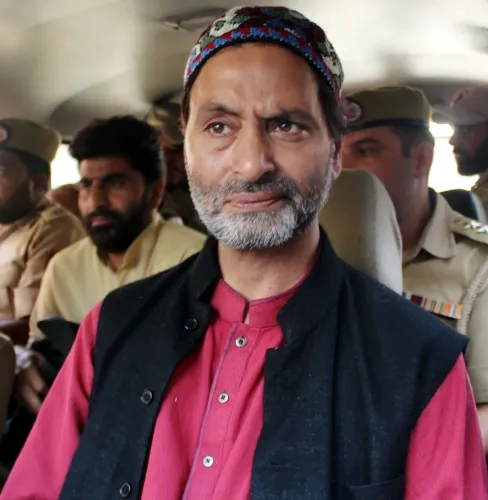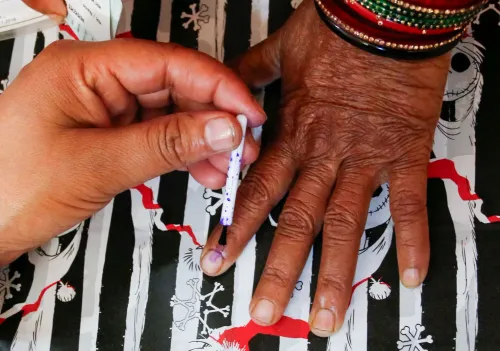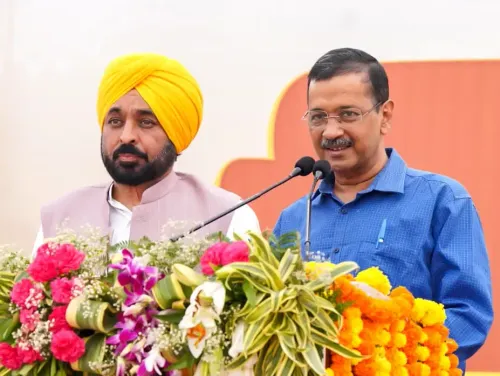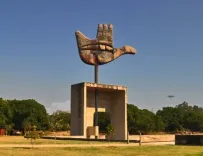What Led to the Outrageous Urination Attack on a Differently-Abled Man in MP?

Synopsis
Key Takeaways
- Shocking public assault highlights issues of violence against differently-abled individuals.
- Immediate police action resulted in arrests amidst public outrage.
- NCRB data reveals a troubling trend of atrocities in Madhya Pradesh.
- Political responses underscore the need for accountability and law reform.
- The incident serves as a grim reminder of societal issues regarding human dignity.
Bhopal/Mandideep, Nov 22 (NationPress) In a shocking act of cruelty, a differently-abled man was victimized in a public space by two of his relatives in the busy market area of Mandideep, located 23 km from Bhopal.
The disturbing footage of this incident, recorded near a petrol station, reveals the victim lying defenseless on the ground while one of the attackers shamelessly urinates on his face, all while bystanders laugh and document the horror. This appalling act, occurring in broad daylight, has highlighted significant issues within Madhya Pradesh's law enforcement, prompting condemnation from various political and human rights groups.
As the video circulated widely, eyewitnesses described the event as heart-wrenching. The victim, a local Divyang in his 40s, was left sprawled on the roadside after succumbing to exhaustion.
After the footage emerged on social media late Friday, it quickly gained traction, leading to immediate police intervention.
Raisen Superintendent of Police (SP) Aditya Kumar confirmed the apprehension of the primary suspect, a resident of nearby Obedullaganj, under various sections of the Indian Penal Code (IPC) for assault, violating modesty, and the Scheduled Castes and Scheduled Tribes (Prevention of Atrocities) Act, 1989, due to the victim's marginalized status.
A second individual, believed to be the one filming the incident, is currently eluding authorities, with police units deployed to locate him.
The incident originated from a routine task that escalated unexpectedly.
The victim and his relatives had come to Mandideep's grain market to sell their harvested paddy from a small farm in Raisen's rural area. After a long day under the November sun, they sought a break at a roadside dhaba. Tensions flared when a dispute over a minor debt—allegedly Rs 500 owed for liquor—became physical.
Witnesses reported that the inebriated assailants shoved the disabled man to the ground during the altercation. What followed was a horrific act of humiliation; the attacker unzipped and urinated directly on the victim's face, mocking his inability to defend himself.
"He was like a rag doll, unable to fight back," recounted a vendor who alerted the authorities. The video, initially shared by a bystander wanting to expose the perpetrator, instead intensified the trauma, with online users decrying it as a stain on humanity.
This incident is not an isolated case in Madhya Pradesh, a state with a troubling history of similar dehumanizing acts.
Data from the National Crime Records Bureau (NCRB) reveals alarming trends: in 2024, MP recorded the highest number of atrocities against Scheduled Castes and Tribes, with over 5,200 cases, including 127 instances of forced exposure to human waste—a 15 percent rise from 2023.
Notable incidents, such as the 2023 case in Sidhi where a tribal laborer was urinated upon, leading to the enforcement of the National Security Act (NSA), and the August 2024 case involving a Dalit man forced to consume urine in Narsinghpur, illustrate systemic failures.
In response, the Congress party has criticized the ruling BJP for its handling of these incidents. State president Jitu Patwari stated at a press conference in Bhopal, "There is no law, no home minister in Madhya Pradesh! This recurring violence against individuals is a unique issue for our state—NCRB statistics confirm it."
The BJP, facing backlash, accused Congress of exploiting tragedy. Chief Minister Mohan Yadav, posting on X, declared, "We have zero tolerance for such barbarism. The perpetrators will face justice; we've allocated Rs 2 lakh in immediate aid for the victim and initiated a fast-track investigation."









